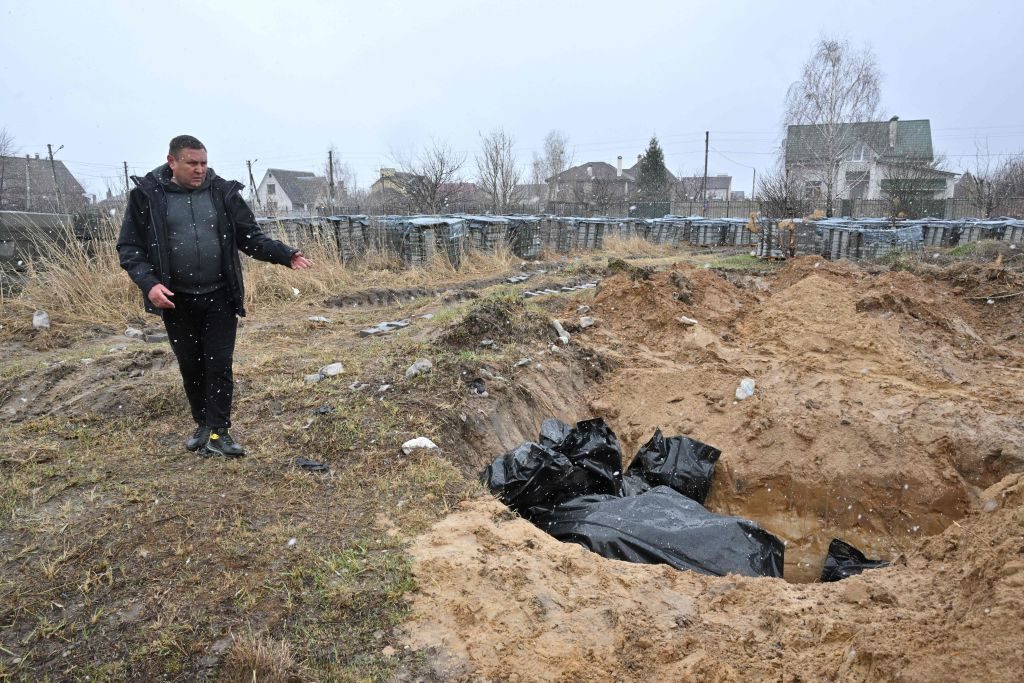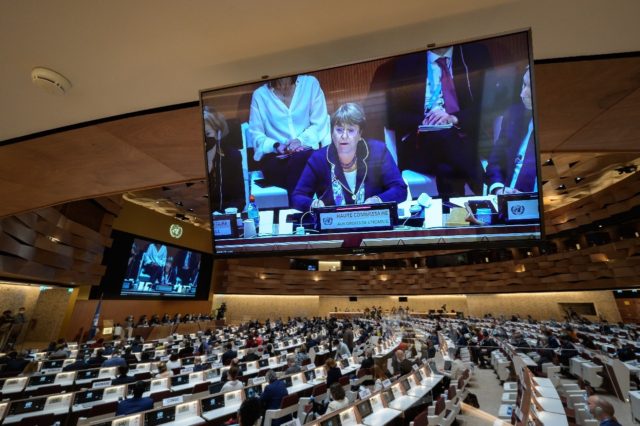The United Nations Human Rights Council (UNHRC) approved four anti-Israel resolutions as it wrapped up its 49th session, including a call for a limited arms embargo, while Russia received a single resolution condemning its invasion of Ukraine.
Israel was the only country to receive more than one resolution against it. North Korea, Iran, Belarus, Myanmar, Nicaragua, and Syria received one resolution apiece for human rights abuses.
The Palestinian Ministry of Foreign Affairs welcomed the resolution calling for a limited arms embargo against Israel, saying it reflected “the principled position of the member states on the importance of accountability of the Israeli colonial and apartheid regime”.
The vote passed with 37-3, with seven abstentions. Brazil, Malawi, and the U.S. voted against.
Last year, the Biden administration rejoined the council, three years after former President Donald Trump withdrew from the U.N. agency over its anti-Israel bias.
President Joe Biden’s envoy to the U.N. Michele Taylor said the Biden administration was “disappointed that [UNHRC] member States continue to disproportionately single out Israel and are dismayed by the many repetitive and one-sided resolutions that run year after year.”

A mass grave in the town of Bucha, northwest of the Ukrainian capital Kyiv on April 3, 2022. Ukraine and Western nations accused Russian troops of war crimes after the discovery of mass graves and “executed” civilians near Kyiv, prompting vows of action at the International Criminal Court. (SERGEI SUPINSKY/AFP via Getty Images)
The resolution called for “all states to refrain from transferring arms when, .. they assess that there is a clear risk that such arms might be used to commit or facilitate serious violations or abuses of international human rights law or serious violations of international humanitarian.”
The Palestinian Ambassador to the U.N. in Geneva Ibrahim Khraishi emphasized Israel should be held accountable for its actions against the Palestinians.
Russia’s President Vladimir Putin has said that Russia is a victim of “cancel culture” like Harry Potter author JK Rowling. https://t.co/bzAnUtOtdR
— Breitbart News (@BreitbartNews) March 25, 2022
“This draft resolution should ensure justice and should hold to account all those who violate international humanitarian law and … to provide reparation and compensation to the [Palestinian] loved one of the victims,” he said.
The other three resolutions were under Agenda Item 7. Both Israel and the U.S., under the Trump administration, have tried unsuccessfully get rid of Agenda Item 7, which mandates that alleged Israeli human rights abuses are discussed at each season, and is the only measure of its kind.

A partially buried body is seen in a mass grave in the town of Bucha, northwest of the Ukrainian capital Kyiv on April 3, 2022. (SERGEI SUPINSKY/AFP via Getty Images)
“No other country – not Iran, not Syria, not North Korea – has an agenda item devoted solely to it. Agenda Item 7 is not directed at anything Israel does. It is directed at the very existence of Israel. It is a blazing red siren signaling the Human Rights Council’s political corruption and moral bankruptcy,” former U.S. envoy to the U.N. Nikki Haley said last year.
Israel’s U.N. mission joked on Twitter the Agenda item had been abolished.
“Ensuring human rights is not a joke. But Item 7 is. It is not about human rights. It is only a relic of a darker past. A relic whose only goal is to demonize Israel.
“Today, on #AprilsFools, it is time for #HRC49 to embrace reality and oppose Item 7,” the mission wrote.
#BREAKING: The Human Rights Council abolishes Item 7 from the @UN_HRC Permanent Agenda! After 16 years of diplomatic fight, the world came to reason! An important day for Israel and the world. An essential step for the credibility of the Council. #HRC49 pic.twitter.com/vPUXsNHmkR
— Israel in UN/Geneva🇱🇺🇳 #HRC49 (@IsraelinGeneva) April 1, 2022
The U.N. also announced over the weekend that it had appointed Francesca Albanese as Special Rapporteur on “the situation of human rights in the Palestinian territories. According to Hillel Neuer, head of monitoring group UN Watch, Albanese has a “documented obsession with comparing Israelis to Nazis and exulting in calling the Jewish state an ‘apartheid’ regime.”
This is not an April Fools joke. The U.N. just appointed @FranceskAlb as their impartial and objective investigator of Israel for the next six years despite her documented obsession with comparing Israelis to Nazis and exulting in calling the Jewish state an “apartheid” regime. https://t.co/HpzkEiTBaM pic.twitter.com/bf6sQx5I6V
— UN Watch (@UNWatch) April 2, 2022
Today's appointment constitutes a gross breach of the Human Rights Council's own rules, which require impartiality for such posts. Francesca Albanese is the opposite: a lifelong supporter of the maximalist Palestinian agenda and an avowed hater of Israel. https://t.co/zQ1T3OxyN0
— UN Watch (@UNWatch) April 2, 2022

COMMENTS
Please let us know if you're having issues with commenting.